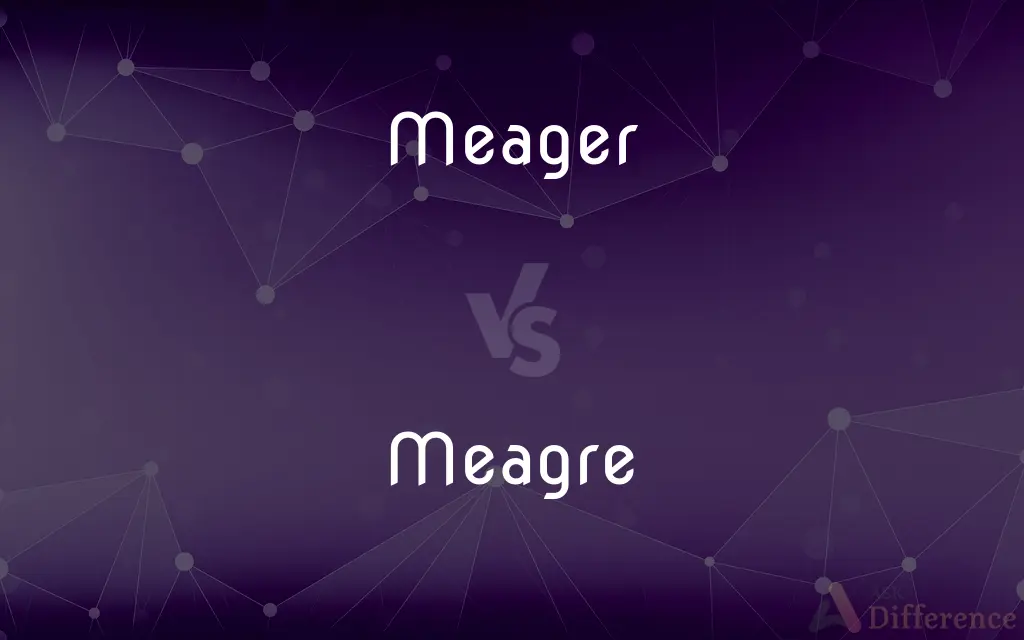Meager vs. Meagre — What's the Difference?
By Tayyaba Rehman & Maham Liaqat — Updated on April 1, 2024
Meager and meagre are variants of the same word, with "meager" used in American English and "meagre" in British English, both meaning lacking in quantity or quality.

Difference Between Meager and Meagre
Table of Contents
ADVERTISEMENT
Key Differences
Meager is the spelling commonly used in American English to describe something that is deficient in quantity or quality, indicating insufficiency or scantiness. Meagre, on the other hand, is the preferred spelling in British English, carrying the same definition and usage. The difference between the two lies purely in regional spelling conventions, reflecting the broader differences between American and British English.
In terms of usage, both "meager" and "meagre" are often applied in contexts related to food, resources, and amounts, emphasizing the inadequacy of what is being described. For instance, a meager salary or meagre earnings highlight financial insufficiency, while a meager meal or meagre portion points to insufficient food.
The distinction does not extend to meaning or connotation; both spellings convey the same sense of something being insufficient or lacking. The choice between "meager" and "meagre" typically depends on the writer's or speaker's regional linguistic preference, aiming for consistency with other regional spellings.
It's important for writers and speakers to be aware of their audience when choosing between "meager" and "meagre." Using the spelling that aligns with the version of English expected by their audience can aid in communication clarity and avoid confusion.
Despite the spelling difference, the pronunciation of "meager" and "meagre" remains largely the same, further underscoring that the variation is purely orthographic. Thus, the choice between the two forms does not impact verbal communication but is an important consideration in written contexts.
ADVERTISEMENT
Comparison Chart
Spelling Region
American English
British English
Definition
Lacking in quantity or quality
Lacking in quantity or quality
Usage Context
Food, resources, amounts, etc.
Food, resources, amounts, etc.
Connotation
Insufficient, scanty
Insufficient, scanty
Audience Consideration
Used when addressing an American audience
Used when addressing a British audience
Compare with Definitions
Meager
Common in discussions about resources.
The drought led to a meager harvest that year.
Meagre
Applied in various contexts to indicate inadequacy.
The amount of detail in the report was meagre and unsatisfactory.
Meager
Reflects insufficiency.
His meager apology did little to assuage their anger.
Meagre
Used in British English.
British literature often describes meagre meals to highlight economic or social issues.
Meager
Applied in various contexts to indicate scarcity.
The evidence provided was meager and inconclusive.
Meagre
Lacking in quantity or quality.
The charity was struggling to provide aid due to meagre donations.
Meager
Lacking in quantity or quality.
The workers complained about their meager wages.
Meagre
Reflects scarcity.
The meagre resources available were insufficient for the project.
Meager
Used in American English.
American recipes often describe a meager portion to emphasize dietary restraint.
Meagre
Common in discussions about financial conditions.
The family lived on a meagre income in the expensive city.
Meager
Deficient in quantity, fullness, or extent; scanty.
Meagre
(of something provided or available) lacking in quantity or quality
They were forced to supplement their meagre earnings
A meagre diet of bread and beans
Meager
Deficient in richness, fertility, or vigor; feeble
The meager soil of an eroded plain.
Meagre
A large predatory marine fish of the drum family, found in the Mediterranean, eastern Atlantic, and south-western Indian Ocean. It is an important food fish in southern Africa.
Meager
Having little flesh; lean.
Meagre
Deficient in quantity, fullness, or extent; scanty.
Meager
Having little flesh; lean; thin.
Meagre
Deficient in richness, fertility, or vigor; feeble
The meager soil of an eroded plain.
Meager
Poor, deficient or inferior in amount, quality or extent
A meager piece of cake in one bite.
Meagre
Having little flesh; lean.
Meager
(set theory) Of a set: such that, considered as a subset of a (usually larger) topological space, it is in a precise sense small or negligible.
Meagre
Argyrosomus regius, an edible fish of the family Sciaenidae.
Meager
(mineralogy) Dry and harsh to the touch (e.g., as chalk).
Meagre
Having little flesh; lean; thin.
Meager
To make lean.
Meagre
Deficient or inferior in amount, quality or extent
Nothing will grow in this meagre soil.
He was given a meagre piece of cake that he swallowed in one bite.
Meager
Destitue of, or having little, flesh; lean.
Meager were his looks;Sharp misery had worn him to the bones.
Meagre
(set theory) Of a set: such that, considered as a subset of a (usually larger) topological space, it is in a precise sense small or negligible.
Meager
Destitute of richness, fertility, strength, or the like; defective in quantity, or poor in quality; poor; barren; scanty in ideas; wanting strength of diction or affluence of imagery; as, meager resources; meager fare. Opposite of ample.
Of secular habits and meager religious belief.
His education had been but meager.
Meagre
(mineralogy) Dry and harsh to the touch (e.g., as chalk).
Meager
Dry and harsh to the touch, as chalk.
Meagre
(transitive) To make lean.
Meager
Less than a desirable amount; - of items distributed from a larger supply.
Meagre
Deficient in amount or quality or extent;
Meager resources
Meager fare
Meager
To make lean.
Meager
Deficient in amount or quality or extent;
Meager resources
Meager fare
Meager
Barely adequate;
A meager allowance
Common Curiosities
Can "meager" and "meagre" be used interchangeably?
Yes, they can be used interchangeably, but it's important to be consistent with the version of English being used.
What does "meager" mean?
"Meager" means lacking in quantity or quality, indicating something is insufficient or scanty.
When should I use "meager" over "meagre"?
Use "meager" when writing for an American audience and "meagre" for a British audience to align with regional spelling conventions.
Is there a difference in pronunciation between "meager" and "meagre"?
No, both words are pronounced the same way, highlighting that the difference is only orthographic.
Are "meager" and "meagre" negative terms?
Yes, both terms have a negative connotation, indicating a deficiency or lack of something.
Are there synonyms for "meager" and "meagre"?
Yes, synonyms include "insufficient," "scanty," "sparse," and "limited."
Is it important to know the audience's preference for "meager" vs. "meagre"?
Yes, knowing your audience's preference helps in maintaining consistency with the regional English being used.
Is "meagre" only used in the UK?
While "meagre" is preferred in British English, it can also be seen in other regions following British English conventions, such as Australia and Canada.
How can I remember the difference between "meager" and "meagre"?
Remember that "e" before "r" in "meagre" reflects the British English spelling, similar to "centre" or "fibre."
What is the difference between "meager" and "meagre"?
The difference is purely in spelling: "meager" is used in American English, while "meagre" is preferred in British English.
Can "meager" and "meagre" apply to non-physical quantities?
Yes, they can describe intangible quantities as well, such as a "meager" understanding or "meagre" evidence.
Can "meager" and "meagre" describe emotions?
Indirectly, they can describe the intensity of emotions, such as "meager" enthusiasm.
How does the use of "meager" or "meagre" affect readability?
The choice doesn’t significantly affect readability but can influence the perceived authenticity and regional alignment of the text.
Does using "meager" or "meagre" change the tone of my writing?
No, the choice between "meager" and "meagre" doesn’t change the tone but can affect the perceived regional accuracy of your writing.
Can the use of "meager" in American English and "meagre" in British English affect SEO?
Yes, using the variant that matches your target audience’s spelling conventions can improve SEO for region-specific searches.
Share Your Discovery

Previous Comparison
Sophomaniac vs. Sophomania
Next Comparison
Writing vs. PothookAuthor Spotlight
Written by
Tayyaba RehmanTayyaba Rehman is a distinguished writer, currently serving as a primary contributor to askdifference.com. As a researcher in semantics and etymology, Tayyaba's passion for the complexity of languages and their distinctions has found a perfect home on the platform. Tayyaba delves into the intricacies of language, distinguishing between commonly confused words and phrases, thereby providing clarity for readers worldwide.
Co-written by
Maham Liaqat















































